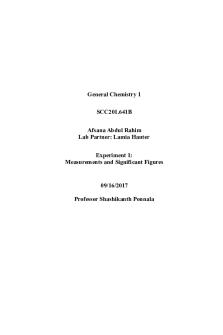General unknown lab report PDF

| Title | General unknown lab report |
|---|---|
| Course | General Chemistry |
| Institution | San Diego State University |
| Pages | 3 |
| File Size | 97.2 KB |
| File Type | |
| Total Downloads | 50 |
| Total Views | 146 |
Summary
It is the General unknown lab report. It is a kind of informal lab report. We had to find ions in the unknown and known solutions. the ions that were present in the unknown areFe3+, Ni2+, Co2+, Cr2+, and the ions present in known are Al3+, Mn2+ Ca2+, Mg2+, Ag+, Cr3+, Ni2+, Cu2+, Co2+, Fe3+, Ba2+....
Description
Chem 201, Section 10 11/17/21
General Unknown Lab Report Unknown #: 44288 Known: Al³⁺, Mn²⁺ Ca²⁺, Mg²⁺, Ag⁺, Cr³⁺, Ni²⁺, Cu²⁺, Co²⁺, Fe³⁺, Ba²⁺
Results: Ions Present
Ions Absent
Fe³⁺
Al³⁺
Ni²⁺
Mn²⁺
Co²⁺
Ca²⁺
Cr²⁺
Mg²⁺ Ag⁺ Ba²⁺ Cu²⁺
Discussion: Fe³⁺:
For the detection of iron, I started with the precipitate from step 2h which was a
light brown color. I then added 20 drops of 2 M sulfuric acid and boiled gently, which turned the solution a green color. Then, I added a drop of 6% H2O2 and the precipitate dissolved. Then I added one drop of 0.2 M potassium thiocyanate turning the solution blood-red instantly, proving the presence of iron.
Fe³⁺ (aq) + KSCN (aq) → Fe(SCN)₆³⁻ (aq) + K⁺(aq)
Co2+:
Originally in the experiment, I detected no presence of the cobalt ion. However, the
spot test proved the presence of cobalt. I added 15 drops of NH4SCN in 50% alcohol to the solution. The solution turned purple showing both cobalt and iron were present. To further determine if cobalt was present, I added NaF(s) until the red color of iron disappeared leaving a teal blue solution proving the presence of the cobalt ion. Co2+(aq) + 4SCN-(aq) →Co(SCN)42- (aq)
Ni²⁺:
With my unknown sample, I added 6 M NH3 (aq) until the solution was alkaline.
The solution then turned blue and no precipitate formed for me to decant. Then I added 4 drops of dimethylglyoxime. Upon addition, a strawberry red precipitate formed proving the presence of Ni²⁺. 2(CH3)2C2N2O2H2 (aq) + Ni2+(aq) → H2O (l) + Ni[(CH3)2C2N2O2H]2 (s)
Cr3+:
To the supernatant of step 3c of the experiment, I added 7 drops of
0.2 M barium chloride. No precipitate formed at this step, remaining a white cloudy mixture. Since no precipitate formed, I skipped to step 3g. I added 3 drops of 3 M nitric acid to the solution and heated it while stirring. No yellow or orange color formed in the solution. I then proceeded to add 10 drops of cold DI water then 10 drops of ether after letting it cool. I also added 1 drop of 6% H2O2 . After mixing and allowing it to settle, a blue color formed in the upper layer of the solution, proving the presence of chromium. Cr2O72- (aq) + 4H2O2 (aq) + 2H+(aq) → 2CrO(O2)2 + 5 H2O (l)...
Similar Free PDFs

General unknown lab report
- 3 Pages

General unknown lab report
- 2 Pages

Unknown Bacteria Lab Report
- 5 Pages

(Sample) Unknown Lab Report
- 6 Pages

Unknown Bacteria lab report
- 5 Pages

CMB Unknown Lab Report
- 5 Pages

Unknown project lab report 4
- 18 Pages

Unknown LAB Report - Grade: a
- 4 Pages

BIOL 3200 Unknown lab report
- 9 Pages

Unknown lab report 2J Final copy
- 25 Pages

General Chemistry Lab Report 3
- 10 Pages

General Chemistry Lab Report 8
- 7 Pages

General Chemistry Lab Report 1
- 10 Pages

Unknown Report - Grade: A+
- 12 Pages
Popular Institutions
- Tinajero National High School - Annex
- Politeknik Caltex Riau
- Yokohama City University
- SGT University
- University of Al-Qadisiyah
- Divine Word College of Vigan
- Techniek College Rotterdam
- Universidade de Santiago
- Universiti Teknologi MARA Cawangan Johor Kampus Pasir Gudang
- Poltekkes Kemenkes Yogyakarta
- Baguio City National High School
- Colegio san marcos
- preparatoria uno
- Centro de Bachillerato Tecnológico Industrial y de Servicios No. 107
- Dalian Maritime University
- Quang Trung Secondary School
- Colegio Tecnológico en Informática
- Corporación Regional de Educación Superior
- Grupo CEDVA
- Dar Al Uloom University
- Centro de Estudios Preuniversitarios de la Universidad Nacional de Ingeniería
- 上智大学
- Aakash International School, Nuna Majara
- San Felipe Neri Catholic School
- Kang Chiao International School - New Taipei City
- Misamis Occidental National High School
- Institución Educativa Escuela Normal Juan Ladrilleros
- Kolehiyo ng Pantukan
- Batanes State College
- Instituto Continental
- Sekolah Menengah Kejuruan Kesehatan Kaltara (Tarakan)
- Colegio de La Inmaculada Concepcion - Cebu

